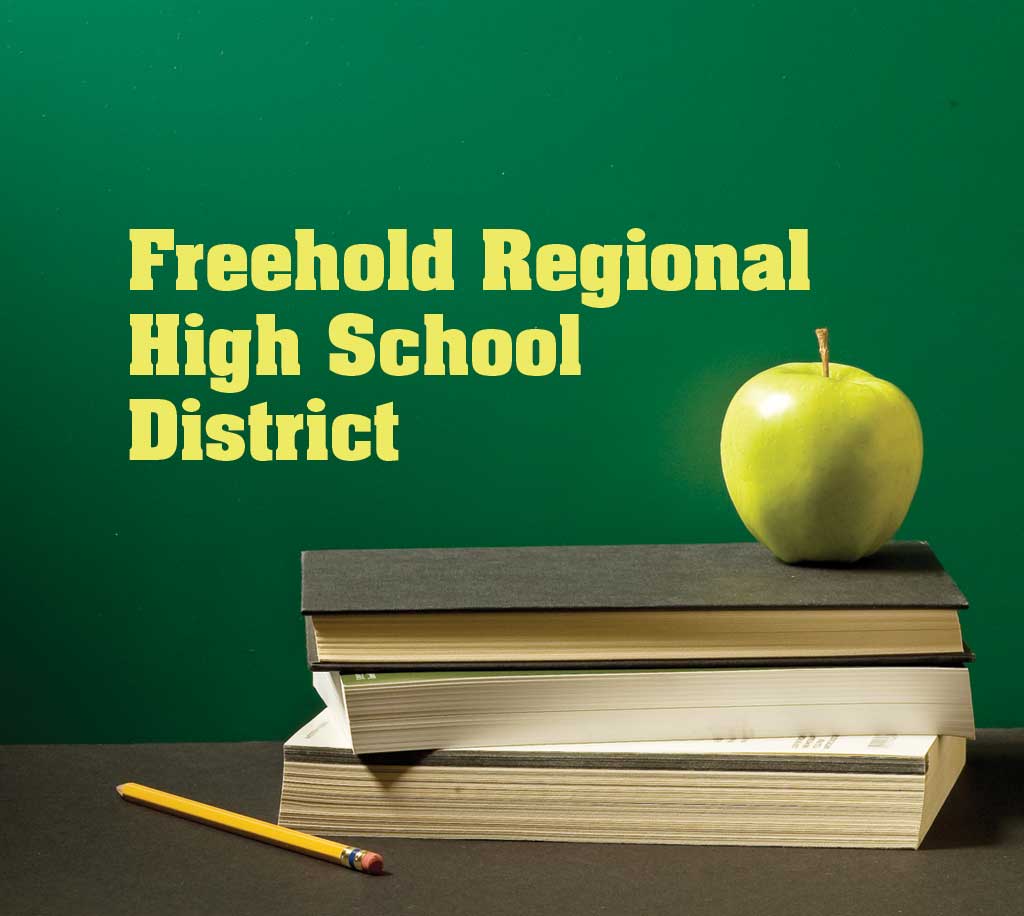The Freehold Regional High School District Board of Education has introduced a $200.81 million budget to support the operation of the district during the 2020-21 school year.
District administrators have fashioned a budget for the upcoming school year that will lose almost $6 million in state aid from the current school year.
Superintendent of Schools Charles Sampson said the continuing loss of state aid “is going to decimate and destroy the FRHSD over the next three years.”
In introducing the 2020-21 budget, district administrators said the spending plan would be supported by the collection of $140.38 million in taxes from residential and commercial property owners in the district’s eight sending municipalities: Colts Neck, Englishtown, Farmingdale, Freehold Borough, Freehold Township, Howell, Manalapan and Marlboro.
The district operates high schools in Colts Neck, Freehold Borough, Freehold Township, Howell, Manalapan and Marlboro. Enrollment, which administrators have said is declining by about 1% per year, currently stands at about 10,800 students.
A public hearing on the budget has been scheduled for 6:30 p.m. April 27. The board may adopt the budget that evening.
The school district’s 2019-20 budget totaled $205.89 million and was supported by a tax levy of $141.76 million. Total spending for the upcoming school year will decrease by $5.08 million and the tax levy for the upcoming school year will decrease by $1.38 million.
In 2020-21, under the terms of legislation known as S-2 that was signed into law by Gov. Phil Murphy in 2018, the district will continue to see its state aid decrease. State aid to the FRHSD will decrease from $46.52 million in 2019-20 to $40.73 million in 2020-21.
Administrators have said the decreases will continue through the 2024-25 school year. Freehold Regional has joined other school districts that are losing state aid in litigation that seeks to overturn S-2.
Regarding the district’s current financial position, Sampson said, “the change in state aid under S-2 is going to decimate and destroy the FRHSD over the next three years.
“I hope our communities voice their concern to Gov. Murphy and Senate President Stephen Sweeney because the magnitude of the state aid loss is unsustainable.
“We will lose approximately 30 positions (in 2020-21) and in 2021-22 (we will lose) at least 70 additional positions. Our classes will be built at 32 students per classroom in 2020-21, which is an absurdly high number,” the superintendent said.
“Less than half of the loss in state aid is offset by the 2% increase in the General Fund tax levy. Compounding the revenue situation is the continued diminishing of our surplus funds that are being used to support the 2020-21 budget and beyond.
“Despite the implementation of participation fees in the amount of $1.25 million … the General Fund revenue is down by $4.7 million (2.3%). The impact on programs and services is severe and compounding as significant cuts in state aid will continue in the years to come.
“For 2020-21, the board is considering about 30 staff reductions, the elimination of after-school busing, as well as changes to busing to and from school, and increases in class size that approach maximum capacity of the physical space in classrooms.
“Structurally speaking, this budget accepts a significant increase in risk to accommodating unforeseen circumstances in 2020-21,” Sampson said.
“Importantly, the 2020-21 budget does not provide for any of the essential work that was included in our recently failed referendum. The referendum was coordinated with the expiration of existing debt.
“For the first time in more than 20 years, there is no debt service (repayment of loans) obligation. Therefore, the aggregate tax impact for 2020-21 is a 1% reduction in the tax levy. The district continues to explore options for completing the essential facility work, including another referendum,” the superintendent said.
Specific information about the impact of the 2020-21 budget on property taxes is expected to be available at the April 27 public hearing.
Freehold Regional High School District taxes are one item on a property owner’s tax bill. The total tax bill also includes municipal taxes, Monmouth County taxes and other assessments.
The amount of taxes an individual pays depends on the assessed value of that individual’s home and/or property and the tax rate that is set by each taxing entity.

